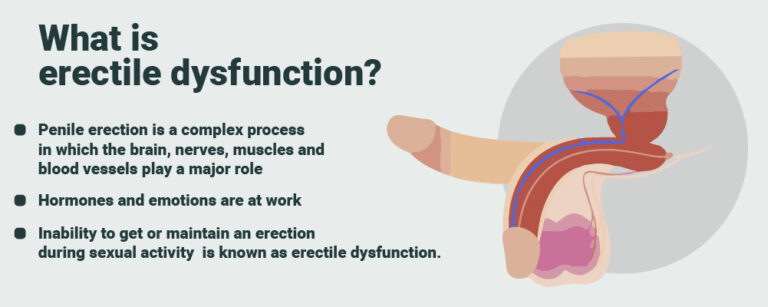Talking About It: Communication Strategies for Dealing with Erectile Dysfunction

Understanding Erectile Dysfunction
Erectile dysfunction (ED) is a common condition that affects many men, but it is often misunderstood or misinterpreted. It is important to have a clear understanding of what ED is and what it is not.

At its core, erectile dysfunction refers to the inability to achieve or maintain an erection that is firm enough for sexual intercourse. It can be a source of frustration, stress, and embarrassment for those experiencing it. However, it is vital to remember that ED is not a reflection of a person’s masculinity or worth as a partner. It is a medical condition that can have various causes and can be treated. Understanding the factors that contribute to ED is the first step towards finding effective solutions.
There are several potential causes of erectile dysfunction, including physical, psychological, and lifestyle factors. Some physical causes may include hormonal imbalances, cardiovascular disease, diabetes, obesity, or certain medications. Psychological factors, such as stress, anxiety, depression, or relationship issues, can also play a role in ED. Furthermore, unhealthy lifestyle choices, such as smoking, excessive alcohol consumption, or a sedentary lifestyle, can contribute to erectile dysfunction. It is essential to consider all of these factors when seeking a comprehensive understanding of the condition.
By enhancing our knowledge and awareness of erectile dysfunction, we can break down the barriers and stigma surrounding this condition. Understanding the root causes and factors involved allows us to approach the issue with compassion and empathy. Armed with the right information, individuals and couples can seek appropriate help and find effective treatments.
Recognizing the Signs and Symptoms
Erectile dysfunction (ED) can be a distressing and frustrating condition for many individuals. Recognizing the signs and symptoms is the first step towards understanding and addressing this issue. While occasional difficulty achieving or maintaining an erection is not uncommon, persistent and recurring problems may indicate the presence of ED.
One of the key symptoms of ED is the inability to achieve or sustain an erection sufficient for sexual intercourse. This can lead to feelings of embarrassment, frustration, and even anxiety. It is important to note that occasional difficulties with erection are not necessarily indicative of a larger problem. However, if you consistently have trouble achieving or maintaining an erection, it may be time to consult a healthcare professional. Additionally, other signs and symptoms can include reduced sexual desire, difficulty reaching orgasm, or experiencing erections that are not firm enough for satisfactory sexual activity. Recognizing these signs is a crucial step in seeking appropriate help and support.
Exploring the Causes of Erectile Dysfunction
Erectile dysfunction (ED) can be a complex issue with multiple underlying causes. Understanding these causes is crucial in order to address the problem effectively. In many cases, ED results from physical factors, such as obesity, diabetes, cardiovascular disease, hormonal imbalances, or neurological conditions. Lifestyle choices, such as smoking, excessive alcohol consumption, and drug use, can also contribute to ED. Additionally, certain medications, such as those for high blood pressure or depression, may have side effects that affect sexual function.
It’s important to note that ED can also have psychological causes. Stress, anxiety, depression, and relationship problems can all impact sexual performance. Performance anxiety, in particular, can create a cycle of worry and performance pressure that exacerbates the problem. Furthermore, past traumas or negative experiences can contribute to psychological factors that affect sexual function. It’s essential to consider both physical and psychological factors when exploring the causes of ED, as they often interact and influence each other.
Breaking the Silence: Initiating the Conversation
Initiating a conversation about erectile dysfunction (ED) may feel uncomfortable or awkward for both partners involved. However, it is a necessary step in addressing the issue and seeking help. By breaking the silence, you can open the door to understanding and support, ultimately strengthening your relationship.

One approach to initiating the conversation is choosing the right time and place. Find a moment when you and your partner are both relaxed and have privacy. This will create a safe space for open and honest communication. It’s important to approach the conversation with sensitivity and empathy, recognizing that ED can be a sensitive topic for many individuals. Remember to speak from a place of concern and love, emphasizing that you are coming from a place of support and understanding.
When discussing ED, it can be helpful to use “I” statements, expressing your feelings and concerns without placing blame. For example, you might say, “I’ve noticed that you seem to be experiencing difficulties with erections lately, and I’m concerned about your well-being.” This approach helps to foster open communication and encourages your partner to share their own thoughts and emotions.
By breaking the silence and initiating the conversation about ED, you are taking the first step towards addressing the issue as a team. Remember, honest and open communication is key to overcoming challenges, and by approaching the topic with empathy and understanding, you can create a supportive environment where both partners feel comfortable seeking the help they need.
Creating a Safe and Supportive Environment
Creating a safe and supportive environment is crucial when addressing erectile dysfunction (ED) with your partner. It is important to establish an atmosphere of trust and understanding, where both partners feel comfortable discussing their feelings and concerns openly. By creating this safe space, you can foster open communication, which is vital in finding solutions and offering emotional support.
One way to promote a safe environment is to approach the conversation with empathy and compassion. Acknowledge that ED can be a sensitive topic and reassure your partner that you are there to support them without judgment. Avoid blame or criticism, as this can only add to the emotional burden your partner may already be experiencing. Instead, focus on listening actively and validating their feelings. By doing so, you show that you genuinely care and are committed to finding a solution together.
Another aspect of creating a safe and supportive environment is being aware of your language and tone. Choose your words carefully to avoid causing further distress or anxiety. Use a calm and non-confrontational tone, offering reassurance that you are in this journey together. Remember, your partner may be feeling vulnerable, so being mindful of your words can go a long way in establishing trust and understanding.
By prioritizing a safe and supportive environment, you lay the foundation for open communication and emotional connection. It is through this atmosphere that you can work together to explore treatment options and address the underlying factors that contribute to ED. Taking the time to create this environment demonstrates your commitment to supporting your partner and finding solutions that promote both physical and emotional well-being.
Active Listening: Understanding Your Partner’s Perspective
Active listening is a key component of understanding your partner’s perspective when it comes to erectile dysfunction (ED). By actively listening, you can create a safe and supportive environment for your partner to express their thoughts, feelings, and concerns. It involves not only hearing their words but also paying attention to their non-verbal cues and emotions.
When practicing active listening, it is important to give your partner your full attention. Put aside distractions and maintain eye contact, showing them that you value their words and are genuinely interested in what they have to say. Avoid interrupting or jumping to conclusions, allowing them to express themselves fully. Reflecting back their words and emotions can help validate their experiences and make them feel understood.
By actively listening to your partner, you can gain valuable insights into their perspective on ED. It allows you to go beyond the physical symptoms and understand the emotional impact it has on them, their self-esteem, and the dynamics of your relationship. This understanding can foster empathy and open up opportunities for effective communication and collaboration in addressing the challenges related to ED.
Offering Emotional Support and Encouragement
When a partner is experiencing erectile dysfunction, it can be a difficult and sensitive situation for both individuals involved. As the partner, offering emotional support and encouragement can play a crucial role in navigating this challenge together. It is important to remember that erectile dysfunction is a common issue that can affect men of all ages, and it does not define the quality of a relationship or the individual’s masculinity.
One way to provide emotional support is by creating a safe and judgment-free environment for open communication. Encourage your partner to share their feelings, concerns, and any anxieties they may be experiencing. It is essential to listen actively and attentively, without interrupting or passing judgment. By validating their emotions and showing empathy, you can help your partner feel understood and supported. Remember, this is an opportunity to strengthen your bond and foster a sense of intimacy and trust.
Seeking Professional Help: The Role of Healthcare Providers

Seeking professional help is a crucial step in addressing the challenges of erectile dysfunction (ED). Healthcare providers play an essential role in diagnosing and treating this condition, ultimately helping individuals regain their sexual health and overall well-being. With their expertise and knowledge, healthcare providers can offer comprehensive assessments, personalized treatment plans, and ongoing support to patients.
During a consultation, healthcare providers will typically conduct a thorough medical history review and physical examination to identify any underlying factors contributing to ED. They may also perform laboratory tests to assess hormone levels, blood flow, or other potential causes. Through this comprehensive evaluation, healthcare providers can determine the most appropriate treatment options and address any associated health concerns that may be impacting sexual function.
As experts in their field, healthcare providers can provide invaluable guidance and education on available treatments for ED. This may include lifestyle modifications, such as changes in diet and exercise, as well as the use of medications or devices that can enhance erectile function. Their experience and knowledge allow them to offer evidence-based recommendations and navigate the individual needs and preferences of each patient.
Moreover, healthcare providers play a crucial role in addressing the emotional and psychological aspects of ED. They can provide support and empathy, ensuring patients feel understood and validated. By creating a safe and non-judgmental environment, healthcare providers can help individuals to open up about their concerns, fears, and anxieties. Through active listening and compassionate communication, healthcare providers can offer emotional support and instill hope in their patients.
Navigating erectile dysfunction can be a challenging and complex journey. However, with the guidance and expertise of healthcare providers, individuals can overcome this condition and regain their sexual satisfaction and overall well-being. Seeking professional help is a vital step towards a fulfilling and healthy sex life.
Exploring Treatment Options for Erectile Dysfunction
When it comes to treating erectile dysfunction (ED), there are several options available that can help restore sexual function and improve overall quality of life. The choice of treatment depends on various factors, including the underlying cause of the condition, the severity of symptoms, and the individual’s overall health.

One common treatment option is oral medications, such as sildenafil (Viagra), tadalafil (Cialis), and vardenafil (Levitra). These medications work by increasing blood flow to the penis, helping to achieve and maintain an erection. It’s important to note that these medications may not be suitable for everyone, especially those who take nitrate medications or have certain pre-existing medical conditions. Therefore, it’s crucial to consult with a healthcare provider before starting any medication.
Another treatment option for ED is injection therapy, where medication is directly injected into the base of the penis. This method helps to relax the blood vessels and increase blood flow, resulting in an erection. Although it may sound intimidating, many men find this treatment effective and easy to administer after a brief instruction from their healthcare provider.
In addition to medication-based treatments, there are also mechanical devices that can help with ED. Vacuum erection devices (VEDs) work by creating a vacuum around the penis, drawing blood into the area and creating an erection. These devices are generally safe and are often used in combination with other treatments.
For those seeking a more long-term solution, surgical options such as penile implants may be considered. A penile implant involves the insertion of inflatable or bendable rods into the penis to enable erections when desired. This option is typically reserved for those who have failed to respond to other treatments or have specific anatomical abnormalities.
It’s important to remember that finding the right treatment for ED often requires a combination of methods, including lifestyle modifications and addressing any underlying health issues. Working closely with a healthcare provider, individuals can explore the available options and determine the most suitable approach to restore sexual function and enhance their overall well-being.
Collaborating as a Team: Involving Your Partner in Decision-Making
Involving your partner in decision-making is a crucial step towards navigating the challenges of erectile dysfunction together. By collaborating as a team, you can create a supportive environment that fosters open communication and shared decision-making. This not only helps your partner feel valued and included, but also allows you to make informed choices about potential treatment options.
When it comes to involving your partner in decision-making, it is important to start by establishing a safe space for open and honest discussions. Encourage your partner to share their thoughts, feelings, and concerns about erectile dysfunction without fear of judgment or blame. Actively listen to their perspective, showing empathy and understanding. Remember, your partner’s input and feedback are valuable, as they offer a unique insight into the emotional and psychological impact of erectile dysfunction on your relationship.
Addressing Psychological Factors: The Impact of Stress and Anxiety
Stress and anxiety are two common psychological factors that can significantly impact a person’s sexual health and contribute to erectile dysfunction (ED). When an individual experiences chronic stress or prolonged periods of anxiety, it can disrupt the delicate balance of hormones and neurotransmitters responsible for sexual arousal and function.
Studies have shown that high levels of stress and anxiety can lead to increased production of cortisol, commonly known as the stress hormone. This elevated cortisol level can interfere with the production of testosterone, the primary male sex hormone, which plays a crucial role in maintaining erectile function. Additionally, stress and anxiety can trigger the release of adrenaline, causing blood vessels to constrict and reducing blood flow to the penis, making it difficult to achieve and sustain an erection.
It is important to note that stress and anxiety can also have a psychological impact on sexual performance. The fear of not being able to perform or meet expectations can further contribute to ED. This creates a cycle of anxiety and worry, perpetuating the problem. Addressing psychological factors such as stress and anxiety is crucial in managing and treating ED effectively.
Improving Intimacy: Non-Sexual Communication and Connection
Improving intimacy in a relationship goes beyond physical connection. Non-sexual communication and connection play a vital role in strengthening emotional bonds and deepening understanding between partners. By consciously focusing on non-sexual aspects of intimacy, couples can cultivate a more profound connection that extends beyond the bedroom.
Effective communication is the foundation of any successful relationship. Taking the time to truly listen and understand your partner’s thoughts, feelings, and experiences fosters empathy and emotional intimacy. Engage in meaningful conversations, ask open-ended questions, and actively listen without judgment. This creates a safe and supportive environment where both partners feel heard and valued. Additionally, non-verbal communication, such as eye contact, touch, and body language, can convey love, affection, and understanding. By nurturing these non-sexual forms of connection, couples can strengthen their emotional bond and enhance overall intimacy within their relationship.
Managing Expectations: Setting Realistic Goals
Setting realistic goals is an essential step in managing expectations when it comes to dealing with erectile dysfunction (ED). It is important for individuals and their partners to understand that there is no one-size-fits-all approach to treatment and improvement. Each person’s experience with ED is unique, and what may work for one individual may not work for another. It is crucial to remember that managing expectations does not mean giving up hope, but rather approaching the situation with a practical mindset.
One way to set realistic goals is by seeking guidance from healthcare providers who specialize in treating ED. They can provide valuable insights into treatment options and help individuals and their partners understand what can be achieved. It is also important for individuals to communicate openly with their partners about their concerns, fears, and expectations. By involving their partners in decision-making and setting realistic goals together, they can create a supportive environment that fosters understanding and collaboration. It is important to remember that progress may take time, and being patient and supportive during the process is crucial.
Maintaining Open Lines of Communication
Maintaining open lines of communication is crucial when dealing with the challenges of erectile dysfunction. It allows both partners to express their feelings, concerns, and needs, fostering understanding and empathy. By keeping communication channels open, you can address any anxieties or fears that may arise and work together towards finding solutions.
To maintain open lines of communication, it’s important to create a safe and non-judgmental space for both partners to express themselves. Choose a time and place where you can have uninterrupted conversations, free from distractions. Listen attentively and empathetically to your partner’s perspective, allowing them to share their thoughts and emotions without interruption or criticism.
Maintaining open lines of communication also involves being honest and transparent about your own feelings and experiences. Sharing your fears and concerns with your partner can help them better understand what you are going through and create a sense of solidarity. Remember to use “I” statements to express yourself, which can ensure that your partner does not feel blamed or attacked.
By actively engaging in open communication, you can strengthen your emotional bond with your partner and work together towards finding effective solutions for erectile dysfunction. Whether it involves seeking professional help, exploring treatment options, or focusing on enhancing intimacy in non-sexual ways, maintaining open lines of communication will be the foundation for a successful journey towards regaining a fulfilling and satisfying relationship.
Sustaining Emotional Intimacy: Exploring Other Forms of Intimacy
Sustaining emotional intimacy in a relationship is vital for overall relationship satisfaction and well-being. While sexual intimacy may be affected by erectile dysfunction, it is important to explore and embrace other forms of intimacy to maintain a strong emotional connection. One form of intimacy that can be cultivated is intellectual intimacy, which involves sharing thoughts, ideas, and engaging in stimulating conversations. This can be achieved by discussing books, current events, or even participating in intellectual activities together. By creating an environment that values intellectual stimulation, couples can strengthen their emotional bond and continue to grow together.
Another form of intimacy that can be explored is experiential intimacy. This involves engaging in shared experiences and creating lasting memories together. Whether it’s traveling to new places, trying new activities, or simply exploring a shared hobby, the act of experiencing things together can deepen emotional intimacy. By stepping outside of their comfort zones and embracing new adventures, couples can create a stronger sense of connection and build a foundation of shared experiences. It is important to remember that emotional intimacy does not solely rely on sexual intimacy, and by actively exploring other forms of intimacy, couples can sustain a strong emotional connection, even in the face of erectile dysfunction.
What are some other forms of intimacy that can help sustain emotional intimacy?
Some other forms of intimacy that can help sustain emotional intimacy include intellectual intimacy, where you engage in deep conversations and share thoughts and ideas with your partner; spiritual intimacy, where you connect on a deeper level through shared beliefs and values; and experiential intimacy, where you create new experiences and memories together.
How can intellectual intimacy contribute to emotional intimacy?
Intellectual intimacy allows you to connect with your partner on a mental level, fostering a deeper understanding and appreciation for each other’s thoughts and ideas. Engaging in deep conversations and sharing intellectual interests can strengthen the emotional bond between you and your partner.
How can spiritual intimacy enhance emotional intimacy in a relationship?
Spiritual intimacy involves connecting with your partner on a deeper level through shared beliefs, values, and experiences. It can provide a sense of meaning and purpose in your relationship, fostering a strong emotional connection and a sense of unity.
What is experiential intimacy and how can it contribute to emotional intimacy?
Experiential intimacy involves creating new experiences and sharing adventures together. By engaging in exciting activities and creating lasting memories, you can deepen your emotional bond with your partner and enhance your overall relationship satisfaction.
Are there any other factors that can impact emotional intimacy apart from erectile dysfunction?
Yes, there are various factors that can impact emotional intimacy in a relationship. These may include communication issues, unresolved conflicts, lack of trust, differences in emotional needs, and external stressors such as work or family pressures. It’s important to address these factors and work on them together to sustain emotional intimacy.






